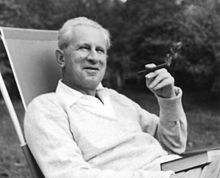
Back Herbert Marcuse Afrikaans Herbert Marcuse ALS Herbert Marcuse AN هربرت ماركوزه Arabic هربرت ماركوزه ARZ Herbert Markuze Azerbaijani هربرت مارکوزه AZB Герберт Маркузэ Byelorussian Херберт Маркузе Bulgarian Herbert Marcuse Catalan
Herbert Marcuse | |
|---|---|
 Marcuse in 1955 | |
| Born | July 19, 1898 |
| Died | July 29, 1979 (aged 81) |
| Nationality |
|
| Alma mater | University of Berlin University of Freiburg |
| Notable work |
|
| Spouses |
|
| Era | 20th-century philosophy |
| Region | Western philosophy |
| School | |
| Doctoral students | |
Main interests | |
Notable ideas | |
| Signature | |
| Part of a series on the |
| Frankfurt School |
|---|
 |
Herbert Marcuse (/mɑːrˈkuːzə/; German: [maʁˈkuːzə]; July 19, 1898 – July 29, 1979) was a German–American philosopher, social critic, and political theorist, associated with the Frankfurt School of critical theory. Born in Berlin, Marcuse studied at Berlin's Friedrich Wilhelm University and then at Freiburg, where he received his Ph.D.[3] He was a prominent figure in the Frankfurt-based Institute for Social Research, which later became known as the Frankfurt School. In his written works, he criticized capitalism, modern technology, Soviet Communism, and popular culture, arguing that they represent new forms of social control.[4]
Between 1943 and 1950, Marcuse worked in U.S. government service for the Office of Strategic Services (predecessor of the Central Intelligence Agency) where he criticized the ideology of the Communist Party of the Soviet Union in the book Soviet Marxism: A Critical Analysis (1958). In the 1960s and the 1970s, he became known as the pre-eminent theorist of the New Left and the student movements of West Germany, France, and the United States; some consider him "the Father of the New Left".[5] In 1974, he was nominated for the Nobel Prize in Literature.[6]
His best-known works are Eros and Civilization (1955) and One-Dimensional Man (1964). His Marxist scholarship inspired many radical intellectuals and political activists in the 1960s and 1970s, both in the United States and internationally.
- ^ a b "Essential Marcuse". Archived from the original on 2021-05-27. Retrieved 2020-10-07.
- ^ "The Frankfurt School and Critical Theory" Archived 2018-02-18 at the Wayback Machine, Internet Encyclopedia of Philosophy.
- ^ Lemert, Charles. Social Theory: The Multicultural and Classic Readings. Westview Press, Boulder, CO. 2010.
- ^ Mann, Douglas. 2008. A Survey of Modern Social Theory. Oxford University Press.
- ^ Rothman, Stanley (2017). The End of the Experiment: The Rise of Cultural Elites and the Decline of America's Civic Culture. Routledge. p. 177. ISBN 978-1-35129562-8. Archived from the original on 2020-08-03. Retrieved 2017-10-31.
- ^ "Nobelarkivet–1974" (PDF). svenskaakademien (in Swedish). January 2025. Retrieved 3 January 2025.